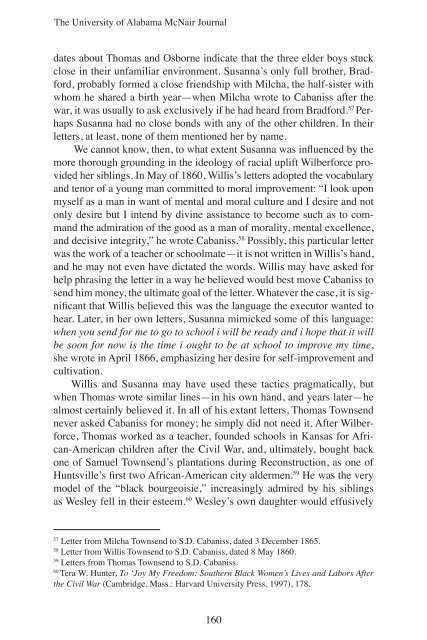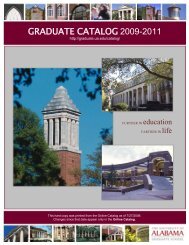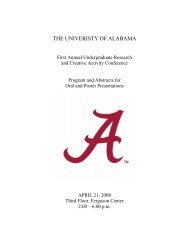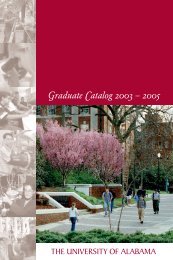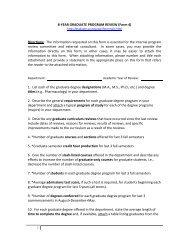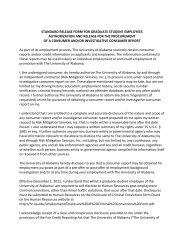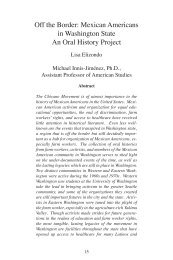Letters from a Planter's Daughter: Understanding Freedom and ...
Letters from a Planter's Daughter: Understanding Freedom and ...
Letters from a Planter's Daughter: Understanding Freedom and ...
Create successful ePaper yourself
Turn your PDF publications into a flip-book with our unique Google optimized e-Paper software.
The University of Alabama McNair Journal<br />
dates about Thomas <strong>and</strong> Osborne indicate that the three elder boys stuck<br />
close in their unfamiliar environment. Susanna’s only full brother, Bradford,<br />
probably formed a close friendship with Milcha, the half-sister with<br />
whom he shared a birth year—when Milcha wrote to Cabaniss after the<br />
war, it was usually to ask exclusively if he had heard <strong>from</strong> Bradford. 57 Perhaps<br />
Susanna had no close bonds with any of the other children. In their<br />
letters, at least, none of them mentioned her by name.<br />
We cannot know, then, to what extent Susanna was influenced by the<br />
more thorough grounding in the ideology of racial uplift Wilberforce provided<br />
her siblings. In May of 1860, Willis’s letters adopted the vocabulary<br />
<strong>and</strong> tenor of a young man committed to moral improvement: “I look upon<br />
myself as a man in want of mental <strong>and</strong> moral culture <strong>and</strong> I desire <strong>and</strong> not<br />
only desire but I intend by divine assistance to become such as to comm<strong>and</strong><br />
the admiration of the good as a man of morality, mental excellence,<br />
<strong>and</strong> decisive integrity,” he wrote Cabaniss. 58 Possibly, this particular letter<br />
was the work of a teacher or schoolmate—it is not written in Willis’s h<strong>and</strong>,<br />
<strong>and</strong> he may not even have dictated the words. Willis may have asked for<br />
help phrasing the letter in a way he believed would best move Cabaniss to<br />
send him money, the ultimate goal of the letter. Whatever the case, it is significant<br />
that Willis believed this was the language the executor wanted to<br />
hear. Later, in her own letters, Susanna mimicked some of this language:<br />
when you send for me to go to school i will be ready <strong>and</strong> i hope that it will<br />
be soon for now is the time i ought to be at school to improve my time,<br />
she wrote in April 1866, emphasizing her desire for self-improvement <strong>and</strong><br />
cultivation.<br />
Willis <strong>and</strong> Susanna may have used these tactics pragmatically, but<br />
when Thomas wrote similar lines—in his own h<strong>and</strong>, <strong>and</strong> years later—he<br />
almost certainly believed it. In all of his extant letters, Thomas Townsend<br />
never asked Cabaniss for money; he simply did not need it. After Wilberforce,<br />
Thomas worked as a teacher, founded schools in Kansas for African-American<br />
children after the Civil War, <strong>and</strong>, ultimately, bought back<br />
one of Samuel Townsend’s plantations during Reconstruction, as one of<br />
Huntsville’s first two African-American city aldermen. 59 He was the very<br />
model of the “black bourgeoisie,” increasingly admired by his siblings<br />
as Wesley fell in their esteem. 60 Wesley’s own daughter would effusively<br />
57 Letter <strong>from</strong> Milcha Townsend to S.D. Cabaniss, dated 3 December 1865.<br />
58 Letter <strong>from</strong> Willis Townsend to S.D. Cabaniss, dated 8 May 1860.<br />
59 <strong>Letters</strong> <strong>from</strong> Thomas Townsend to S.D. Cabaniss.<br />
60 Tera W. Hunter, To ‘Joy My <strong>Freedom</strong>: Southern Black Women’s Lives <strong>and</strong> Labors After<br />
the Civil War (Cambridge, Mass.: Harvard University Press, 1997), 178.<br />
160


